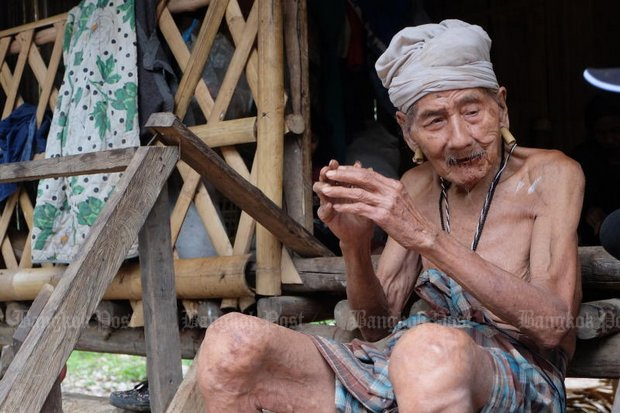
Karen spiritual leader Ko-ee Mimee has lost the final battle, with his last wish of going back home to the deep forest unfulfilled.
The 107-year-old man died while being treated for pneumonia at King Mongkut Memorial Hospital (Phra Chom Klao Hospital) in Phetchaburi province. But it's known that he's been traumatised with heartbrokenness for years.

Ko-ee, who was cordially called by the Thai media "grandpa", was born in 1911 as an ethnic Karen in a jungle on the border between Ratchaburi and Phetchaburi province. Yet his right to being a Thai citizen had been overlooked most of his life. It was in August this year that the Interior Ministry recognised his right, granting him Thai citizenship together with a 13-digit ID card.
But the state still ignored his appeal to return home. The grandpa always said he wanted to die in his birthplace, rather than in the relocation area.
Ko-ee, together with his family and fellow Karen villagers, who lived deep in the Kaeng Krachan forest, are victims of state violence.
His livelihood in the forest was threatened following the promulgation of the wildlife preservation and protection law in 1961. Two decades later, when the state declared the Kaeng Krachan forest as a national park, Ko-ee's land was annexed as part of the conservation area, and his and other Karen villagers' ancestral right was unfairly trampled.
The nightmare began when the state came up with the idea of nominating Kaeng Krachan forest as a World Heritage site, and implemented eviction. As Ko-ee and the villagers resisted, and National Park officers led by then park chief Chaiwat Limlikhit-aksorn resorted to violence in May 2011, setting their houses and rice barns on fire. Ko-ee was pushed on a helicopter to a relocation site.
During the long fight for his ancestral right, and a chance to return home, Ko-ee experienced sad losses. A young friend who assisted him and others in their petition with human rights agencies was soon shot dead. Police linked the killing with the Kaeng Krachan forest conflict and eviction. But the police never came to arrest any culprits.
In 2014, his grandson and rights activist Porlajee "Billy" Rakchongcharoen mysteriously vanished, in what is believed to be a case of enforced disappearance. His disappearance took place at the time he was trying to help his fellow Karen gain the legal right to go back home. Billy was last seen on April 17, 2014 when he was taken into custody by then park chief Chaiwat who claimed he spotted the activist with honey and briefly held him but later released. Again, no one was punished for the crime.
Mr Chaiwat was arrested, taken to court but was eventually discharged for "lack of evidence." He was later reinstated in the Ministry of Natural Resources and the Environment and the case went nowhere. The Department of Special Investigation, after throwing out a petition from Billy's family seeking justice, finally agreed to accept the case in what was seen as a ceremonial move to appease international human rights defenders.
At the same time, the Administrative Court, while punishing those involved in the forced eviction and burning of the Karen community's homes for excessive force in its ruling in June this year, still threw out their petition to return home on the grounds that they had no land ownership documents proving their rights to live in the forest. But how could those living in remote areas, with little -- or zero -- knowledge about legal procedures, be aware that they had to seek legal documents to gain property ownership rights when the conservation law took effect? Any decision about the fate of these Karen of Kaeng Krachan should be made in regard to the village history that dates back more than a century, not just state papers in a system that is notoriously inefficient.
Later, the Supreme Administrative Court ruled the national parks department pay more to those affected by the forced relocation -- about 50,000 baht to each of the Karen families in compensation for their destroyed houses and rice barns. However, the judge fell short of making a bold decision that would turn the customary right blessed by the constitution into action. The chance of going back home for the rest of the Karen villagers is still dim.
It's sad that Ko-ee has died with his dream unfulfilled. But let's hope that the dream will not be forgotten which means the right of the Karen at Ban Bang Kloi must be recognised and that they have a chance to prove that people and forest can coexist. The spirit of the charter that blesses communal rights must be respected.
On top of that, the authorities involved in the investigation of his grandson's disappearance should speed up the work, find the culprits and ensure justice for the bereaved family.
With this, grandpa could rest in peace.
